Exploring the Connection Between Addiction and Obesity: Innovative Treatment Approaches
March 20, 2025 - 13:08

Addiction and obesity are increasingly recognized as interconnected issues, both stemming from complex neurological processes. Recent research has shed light on how these conditions can influence one another, creating a cycle that is challenging to break. As scientists delve deeper into the psychology of these disorders, innovative treatments are emerging, offering hope for those affected.
Among the promising new therapies are GLP-1 receptor agonists, which have shown effectiveness in promoting weight loss and reducing cravings associated with addictive behaviors. These medications work by mimicking the action of a hormone that regulates appetite and glucose metabolism, potentially leading to improved outcomes for individuals struggling with obesity and addiction.
Additionally, the introduction of MEAI (a novel compound) is garnering attention for its potential to modulate reward pathways in the brain. By targeting the underlying mechanisms of both addiction and obesity, these treatments aim to disrupt the harmful cycles that perpetuate these conditions.
As research continues, the integration of psychological and pharmacological strategies may pave the way for more effective interventions, ultimately improving the quality of life for many individuals facing these challenges.
MORE NEWS

March 1, 2026 - 08:18
New psychology research reveals a vicious cycle involving smartphone use and feelings of disconnectionNew psychology research reveals a troubling daily cycle where smartphone use and feelings of loneliness intensify one another. A study published in the journal Addictive Behaviors provides...

February 28, 2026 - 23:13
AI in, Garbage Out: Is Meta-Analysis in Danger?A cornerstone of modern psychology, the meta-analysis, is facing a novel and significant threat from the proliferation of fake, AI-generated scientific papers. This method, which statistically...

February 28, 2026 - 10:20
Critiquing Israel is not Anti-Semitism: The American Psychological AssociationIn a significant statement, the American Psychological Association has clarified the crucial distinction between criticizing the policies of the Israeli government and antisemitism. This move...

February 27, 2026 - 23:59
Psychology Suggests the U.S. Army Needs to Do More To Battle A New Enemy (Not Russia or China): LonelinessA recent study highlights a growing, non-traditional adversary within the U.S. military ranks: pervasive loneliness. While the Army possesses deep institutional knowledge for building unit cohesion...